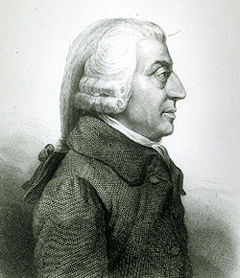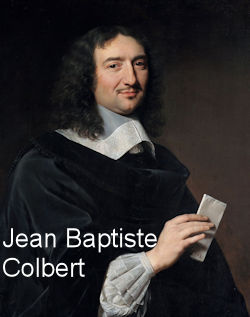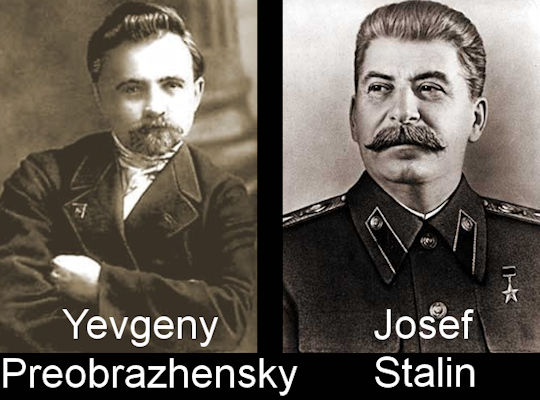|
Adam
Smith
and
the
Physiocrats
 An Inquiry into the Nature and Causes of An Inquiry into the Nature and Causes of
The Wealth of Nations, 1776
Book IV, Chapter 9
Of the Agricultural Systems, or of those Systems of
Political Economy which represent the Produce of Land as
either the sole or the principal Source of the Revenue and
Wealth every Country
[IV, ix, 1, p. 663]
THE agricultural systems of
political economy will not require so long an explanation
as that which I have thought it necessary to bestow upon
the mercantile or commercial system.
That system which represents the
produce of land as the sole source of the revenue and
wealth of every country has, so far as I know, never been
adopted by any nation, and it at present exists only in
the speculations of a few men of great learning and
ingenuity in France…
 [IV, ix,
3, p. 663] [IV, ix,
3, p. 663]
Mr. Colbert, the famous minister of Louis
XIV, was a man of probity, of great industry and knowledge
of detail, of great experience and acuteness in the
examination of public accounts, and of abilities, in
short, every way fitted for introducing method and good
order into the collection and expenditure of the public
revenue. That minister had unfortunately embraced all the
prejudices of the mercantile system, in its nature and
essence a system of restraint and regulation, … He was not
only disposed, like other European ministers, to encourage
more the industry of the towns than that of the country;
but, in order to support the industry of the towns, he was
willing even to depress and keep down that of the country.
In order to render provisions cheap to the inhabitants of
the towns, and thereby to encourage manufactures and
foreign commerce, he prohibited altogether the exportation
of corn, and thus excluded the inhabitants of the country
from every foreign market for by far the most important
part of the produce of their industry. This prohibition,
joined to the restraints imposed by the ancient provincial
laws of France upon the transportation of corn from one
province to another, and to the arbitrary and degrading
taxes which are levied upon the cultivators in almost all
the provinces, discouraged and kept down the agriculture
of that country very much below the state to which it
would naturally have risen in so very fertile a soil and
so very happy a climate…
NOTE: COMPARE TO PREOBRAZHENSKY / STALIN
“PRIMITIVE SOCIALIST ACCUMULATION”

[IV, ix, 4, p. 664]
If the rod be bent too much one
way, says the proverb, in order to make it straight you
must bend it as much the other. The French philosophers,
who have proposed the system which represents agriculture
as the sole source of the revenue and wealth of every
country, seem to have adopted this proverbial maxim; and
as in the plan of Mr. Colbert the industry of the towns
was certainly overvalued in comparison with that of the
country; so in their system it seems to be as certainly
undervalued.
The different orders of people
who have ever been supposed to contribute in any respect
towards the annual produce of the land and labour of the
country, they divide into three classes. The first is the
class of the proprietors of land. The second is the class
of the cultivators, of farmers and country labourers, whom
they honour with the peculiar appellation of the
productive class. The third is the class of artificers,
manufacturers, and merchants, whom they endeavour to
degrade by the humiliating appellation of the barren or
unproductive class.
[IV, ix, 7, p. 665 (bottom)]
… The rent which properly belongs to the landlord is no
more than the net produce which remains after paying in
the completest manner all the necessary expenses which
must be previously laid out in order to raise the gross or
the whole produce. It is because the labour of the
cultivators, over and above paying completely all those
necessary expenses, affords a net produce of this kind
that this class of people are in this system peculiarly
distinguished by the honourable appellation of the
productive class…
[IV, ix, 10, p. 667 (top)]
… The stock of the farmer yields him a profit as well as
that of the master manufacturer; and it yields a rent
likewise to another person, which that of the master
manufacturer does not. The expense, therefore, laid out in
employing and maintaining artificers and manufacturers
does no more than continue, if one may say so, the
existence of its own value, and does not produce any new
value. It is therefore altogether a barren and
unproductive expense. The expense, on the contrary, laid
out in employing farmers and country labourers, over and
above continuing the existence of its own value, produces
a new value, the rent of the landlord. It is therefore a
productive expense.
[IV, ix, 13, p. 668]
Artificers, manufacturers, and merchants can
augment the revenue and wealth of their society by
parsimony only; or, as it in this system, by privation,
that is, by depriving themselves a part of the funds
destined for their own subsistence. They annually
reproduce nothing but those funds. Unless, therefore, they
annually save some part of them, unless they annually
deprive themselves of the enjoyment of some part of them,
the revenue and wealth of their society can never be in
the smallest degree augmented by means of their industry.
Farmers and country labourers, on the contrary, may enjoy
completely the whole funds destined for their own
subsistence, and yet augment at the same time the revenue
and wealth of their society...
Nations therefore which,
like France or England, consist in a great measure of
proprietors and cultivators can be enriched by industry
and enjoyment. Nations, on the contrary, which, like
Holland and Hamburg, are composed chiefly of merchants,
artificers, and manufacturers can grow rich only through
parsimony and privation. As the interest of nations so
differently circumstanced is very different, so is
likewise the common character of the people: in those of
the former kind, liberality, frankness and good fellowship
naturally make a part of that common character: in the
latter, narrowness, meanness, and a selfish disposition,
averse to all social pleasure and enjoyment.
[IV, ix, 26, p. 672]
Though, by this oppressive policy
[mercantilism], a landed nation should be able to raise up
artificers, manufacturers, and merchants of its own
somewhat sooner than it could do by the freedom of trade a
matter, however, which is not a little doubtful- yet it
would raise them up, if one may say so, prematurely, and
before it was perfectly ripe for them. By raising up too
hastily one species of industry, it would depress another
more valuable species of industry… By raising up too
hastily a species of industry which only replaces the
stock which employs it, together with the ordinary profit,
it would depress a species of industry which, over and
above replacing that stock with its profit, affords
likewise a net produce, a free rent to the landlord. It
would depress productive labour, by encouraging too
hastily that labour which is altogether barren and
unproductive.
In
the next paragraph, Adam Smith seemed to be far ahead
of his time with a basic understanding of homeostasis
- the ability of a human body or of other complex
systems to adapt themselves to their environment. The
concept is usually credited to Claude Bernard
(1813-1878), a famous French physiologist, and the
term, homeostasis, was coined by Walter Cannon
(1871-1945), a Harvard physiologist who also coined
the term "fight or flight response", both in his 1932
book, The Wisdom of the Body.
[IV, ix, 28, p. 673]
Some speculative physicians seem to have
imagined that the health of the human body could be
preserved only by a certain precise regimen of diet and
exercise, of which every, the smallest, violation
necessarily occasioned some degree of disease or disorder
proportioned to the degree of the violation. Experience,
however, would seem to show that the human body frequently
preserves, to all appearances at least, the most perfect
state of health under a vast variety of different
regimens; even under some which are generally believed to
be very far from being perfectly wholesome. But the
healthful state of the human body, it would seem, contains
in itself some unknown principle of preservation, capable
either of preventing or of correcting, in many respects,
the bad effects even of a very faulty regimen. Mr.
Quesnay, who was himself a physician, and a very
speculative physician, seems to have entertained a notion
of the same kind concerning the political body, and to
have imagined that it would thrive and prosper only
[emphasis added] under a certain precise regimen, the
exact regimen of perfect liberty and perfect justice. He
seems not to have considered that, in the political body,
the natural effort which every man is continually making
to better his own condition is a principle of preservation
capable of preventing and correcting, in many respects,
the bad effects of a political economy, in some degree,
both partial and oppressive. Such a political economy,
though it no doubt retards more or less, is not always
capable of stopping altogether the natural progress of a
nation towards wealth and prosperity, and still less of
making it go backwards. If a nation could not prosper
without the enjoyment of perfect liberty and perfect
justice, there is not in the world a nation which could
ever have prospered. In the political body, however, the
wisdom of nature has fortunately made ample provision for
remedying many of the bad effects of the folly and
injustice of man, in the same manner as it has done in the
natural body for remedying those of his sloth and
intemperance.
[IV, ix, 29, p. 674]
The capital error of this system,
however, seems to lie in its representing the class of
artificers, manufacturers, and merchants as altogether
barren and unproductive. The following observations may
serve to show the impropriety of this representation.
First, this class, it is
acknowledged, reproduces annually the value of its own
annual consumption, and continues, at least, the existence
of the stock or capital which maintains and employs it.
But upon this account alone the denomination of barren or
unproductive should seem to be very improperly applied to
it. We should not call a marriage barren or unproductive
though it produced only a son and a daughter, to replace
the father and mother, and though it did not increase the
number of the human species, but only continued it as it
was before. Farmers and country labourers, indeed, over
and above the stock which maintains and employs them,
reproduce annually a net produce, a free rent to the
landlord. As a marriage which affords three children is
certainly more productive than one which affords only two;
so the labour of farmers and country labourers is
certainly more productive than that of merchants,
artificers, and manufacturers. The superior produce of the
one class, however, does not render the other barren or
unproductive.
[IV, ix, 38, p. 678]
This system, however, with all its
imperfections is, perhaps, the nearest approximation to
the truth that has yet been published upon the subject of
political economy, and is upon that account well worth the
consideration of every man who wishes to examine with
attention the principles of that very important science.
Though in representing the labour which is employed upon
land as the only productive labour, the notions which it
inculcates are perhaps too narrow and confined; yet in
representing the wealth of nations as consisting, not in
the unconsumable riches of money, but in the consumable
goods annually reproduced by the labour of the society,
and in representing perfect liberty as the only effectual
expedient for rendering this annual reproduction the
greatest possible, its doctrine seems to be in every
respect as just as it is generous and liberal…
The admiration of this
whole sect for their master, who was himself a man of the
greatest modesty and simplicity, is not inferior to that
of any of the ancient philosophers for the founders of
their respective systems. "There have been, since the
world began," says a very diligent and respectable author,
the Marquis de Mirabeau, "three great inventions which
have principally given stability to political societies...
The first is the invention of writing, which alone gives
human nature the power of transmitting, without
alteration, its laws, its contracts, its annals, and its
discoveries. The second is the invention of money, which
binds together all the relations between civilized
societies. The third is the Economical Table, the result
of the other two, which completes them both by perfecting
their object; the great discovery of our age, but of which
our posterity will reap the benefit."
[IV, ix, 50, p. 687]
It is thus that every system
which endeavours, either by extraordinary encouragements
to draw towards a particular species of industry a greater
share of the capital of the society than what would
naturally go to it, or, by extraordinary restraints, force
from a particular species of industry some share of the
capital which would otherwise be employed in it, is in
reality subversive of the great purpose which it means to
promote. It retards, instead of accelerating, the progress
of the society towards real wealth and greatness; and
diminishes, instead of increasing, the real value of the
annual produce of its land and labour.
All systems either of preference
or of restraint, therefore, being thus completely taken
away, the obvious and simple system of natural liberty
establishes itself of its own accord. Every man, as long
as he does not violate the laws of justice, is left
perfectly free to pursue his own interest his own way, and
to bring both his industry and capital into competition
with those of any other man, or order of men. The
sovereign is completely discharged from a duty, in the
attempting to perform which he must always be exposed to
innumerable delusions, and for the proper performance of
which no human wisdom or knowledge could ever be
sufficient; the duty of superintending the industry of
private people, and of directing it towards the
employments most suitable to the interest of the society.
According to the system of natural liberty, the sovereign
has only three duties to attend to; three duties of great
importance, indeed, but plain and intelligible to common
understandings: first, the duty of protecting the society
from violence and invasion of other independent societies;
secondly, the duty of protecting, as far as possible,
every member of the society from the injustice or
oppression of every other member of it, or the duty of
establishing an exact administration of justice; and,
thirdly, the duty of erecting and maintaining certain
public works and certain public institutions which it can
never be for the interest of any individual, or small
number of individuals, to erect and maintain; because the
profit could never repay the expense to any individual or
small number of individuals, though it may frequently do
much more than repay it to a great society.
|

 An Inquiry into the Nature and Causes of
An Inquiry into the Nature and Causes of [IV, ix,
3, p. 663]
[IV, ix,
3, p. 663]